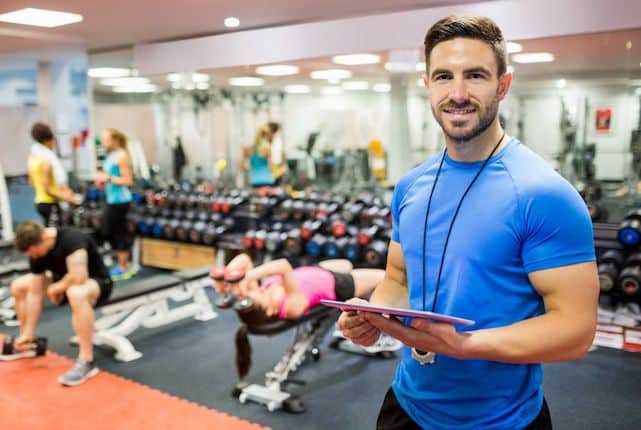
Strength and conditioning coaches inspire athletes to become their best. Are you an athlete driven to achieve your best performance? Do you like inspiring others to do the same?
Strength and conditioning coaches help athletes in high school, college, or on professional teams become the best athletes they can be. A good coach combines up-to-date, proven training methods with effective communication to inspire athletes to break through barriers and achieve more.
What does a strength and conditioning coach do?
The best person to coach up-and-coming athletes is often an athlete themselves. Many individuals who land a strength and conditioning job were athletes in college or high school with firsthand experience of the differences that good coaching makes.
 Job duties of a strength and conditioning coach can include:
Job duties of a strength and conditioning coach can include:
- Designing and implementing training and fitness programs.
- Demonstrating proper and safe use of training equipment.
- Teaching sports and game skills to athletes.
- Maintaining professionalism as athletes and as a team.
Depending on the job, a strength and conditioning coach may also maintain a fitness center or weight room while offering personal training.
What kind of degree do I need to become a strength and conditioning coach?
Strength and conditioning jobs can be found in high schools, colleges and universities, and professional sports teams. These jobs require a bachelor’s degree and certification. The highest-paying jobs, especially those at the university or professional team level, require master’s degrees.
There are multiple college majors that give you a great start to becoming a strength and conditioning coach, such as physical education, physiology, and exercise science. Your choice of a college major is important because you’ll be spending four years (or more) studying it and likely focusing on this area professionally!
To help you choose your major, ask yourself these questions about why you’re interested in becoming a strength and conditioning coach:
- What about this career is appealing to you?
- Do you want to teach others?
- Are you fascinated by excercise science?
- Are you driven by a career goal?
Look closely at the course offerings for various majors. Choose what sounds the most interesting, most engaging, and the best path for your career goals.
Strength and conditioning coach majors:
• Physical education
Physical education is most useful for careers in K-12 education. Classes focus on teaching health and wellness to children of different age groups and fitness abilities. Included in this major are educational theory, psychology, and an unpaid internship. Teachers in many states also require a special teacher’s license to teach, so contact your state’s Department of Education. Getting a master’s in physical education is also an option.
• Physiology
If you like the science of human health and fitness, a degree in physiology is for you. A popular choice for pre-med students, physiology focuses on analyzing living organisms from the cellular level up to the entire body. This degree will allow you to get a job or to advance and earn a research-based master’s degree.
• Exercise science
Classes in exercise science focus on various ways to promote wellness to all people regardless of age, fitness level, ability, or disability. You’ll learn about sports performance, prevention, and rehabilitation of injuries, nutrition, anatomy, physiology, and kinesiology. This degree gives you skills for all kinds of coaching jobs.
Strength and conditioning internships
Strength and conditioning coaches usually get their first professional experience with an internship. To hit the ground running in the job market after graduation, you should get an internship while you’re still earning your bachelor’s degree.

Places to look for strength and conditioning internships include:
- Gyms and fitness centers in your area or near your school.
- Lists of approved internship programs from certification programs.
- Ask college professors and staff.
- Student teaching as an education major.
A typical strength and conditioning internship is an unpaid volunteer experience. Some you must pay for in the form of tuition, such as student teaching for a physical education degree. Paid internships are out there, but they’re not as common.
What you’ll get with an internship, though, is the experience you need to become a strength and conditioning coach, as well as references to get into a graduate program or land your first strength and conditioning job.
Strength and conditioning coach certification
Once you’ve graduated with your degree, you’ll need to become certified as a strength and conditioning coach, and there are two main options. Each requires that you hold a bachelor’s degree and pass an examination administered by the certifying body. Read through the program requirements and carefully consider which certification is the most appropriate for your career goals.
- National Strength and Conditioning Association: Certified Strength and Conditioning Specialist (CSCS) (most common)
- Collegiate Strength & Conditioning Coaches Association: Strength and Conditioning Coach Certified (SCCC)
If you want to specialize in specific types of strength and conditioning or would like to offer extensive personal training, you could benefit from these optional, additional training and certifications:
- USA Weightlifting (USAW) for Olympic weightlifting
- National Academy of Sports Medicine for coaches and personal trainers
How to become a strength and conditioning coach for high school
High school strength and conditioning coaches teach physical education classes (or other subjects, if you’re certified) to students of various ages and might also coach team sports. Many successful athletes have a beloved coach from middle school or high school. If you want to inspire youth to begin their journeys as athletes, your talents would be of great use as a high school strength and conditioning coach.
The best college major for high school strength and conditioning jobs is physical education. In four years, you can earn a bachelor’s degree and complete the internship necessary to get a job.
Teachers are needed across the country and in all environments, urban and rural. High school strength and conditioning jobs are plentiful. Physical education teacher job salaries vary by state (see various state salaries here) but start at around $30,000 per year and include benefits and retirement accounts. Keep in mind that with experience and further education, such as a master’s degree, the salary increases.
How to become a strength and conditioning coach for college
Strength and conditioning jobs at colleges and universities are coveted positions, and you may find that the competition is fierce. Coaches with proven training methods and charisma have the upper hand in landing these coaching jobs.
A master’s degree is required at a minimum to get a job as a college strength and conditioning coach. It’s advised to start planning your coursework and internships while you’re still an undergraduate. Seek out opportunities to implement your best ideas and show that you’re the perfect coach for the best athletes. Build your resume and be open to opportunities as jobs become available.
ZipRecruiter reports that college strength and conditioning coaches make anywhere between $40,000 and $100,000 per year.
How much does a strength and conditioning coach make?
According to Payscale.com, strength and conditioning coaches make between $26,000 and $62,000 per year. Salary increases with years of experience, as well as the highest level of education completed. Those with master’s degrees earn more.
At the highest end of the scale, USA Today recently published a list of the highest-paid coaches in the NCAA. Coaches of high-profile teams can make six figures, topping out at $750,000 per year.





